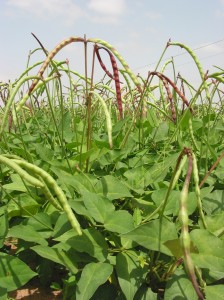Transforming Grain-Legume Systems to Enhance Nutrition and Livelihoods

The Pulse CRSP meeting highlighted many of the CRSP's research advances that are aligned with FTF strategies.
In February 2012, the Dry Grain Pulses (Pulse) CRSP cohosted with the Rwanda Agriculture Board a five day global pulse research meeting attended by approximately 100 grain legume scientists from over 25 countries. In addition to Pulse CRSP U.S. and host country scientists representing many diverse disciplines (e.g., genomics, breeding, pathology, IPM, nutrition, food chemistry, economics and marketing), researchers from numerous collaborating institutions also attended including from several international agriculture research centers (CIAT, IITA and ICRISAT), the McKnight Foundation, N2-Africa, and national agriculture research systems from eastern Africa.
At the meeting researchers shared advances in increasing grain legume productivity, reducing vulnerability to biotic and abiotic stresses, transforming multi-functional smallholder legume-based farming systems, improving the nutritional quality of diets and the nutritional status of children, and enhancing the livelihoods of stakeholders of pulse value-chains, especially women. These are priorities aligned with the U.S. Government’s Feed the Future Global Food Security Research Strategy.
A highlight of the conference was a visit by Rwanda’s Minister of Agriculture and Animal Resources, the Honorable Dr. Agnes Kalibata. She stated that Rwanda leads the world in per capita consumption of common beans. Improved varieties of climbing beans have enabled smallholder farmers to achieve grain yields of over 5,000 kilos per hectare.
For the past five years, the Pulse CRSP has supported fourteen collaborative projects in nineteen countries in Africa and Central America. Meeting participants learned of important research achievements including gains in genetic resistance to root rots in common bean, use of molecular markers for improving drought tolerance in cowpea, effectiveness of biologicals in controlling pod-sucking insects in cowpeas, and the explanation of the role of bean constituents in improving gut health and nutrient absorption. In the session on seed systems, the sustainability attributes of community based seed multiplication were discussed and the effectiveness of the “community seed banks” model being promoted by a USAID supported project through the Pulse CRSP in Nicaragua, Honduras, and Guatemala.
Four Pulse CRSP scientists were honored with the Technical Management Administrative Council Award for Meritorious Professional Achievement. This award recognizes the lifelong research achievements of scientists which resulted in technologies and policies that benefitted smallholder farmers in developing countries. The award was given to Dr. James Scott Beaver, Universidad de Puerto Rico; Dr. Juan Carlos Rosas Sotomayor, Escuela Agicola Panamericana-Zamorano, Honduras; Dr. Ndiaga Cisse, Institut Senegalais de Recherches Agricoles; and Dr. Richard Bernsten, Michigan State University.
